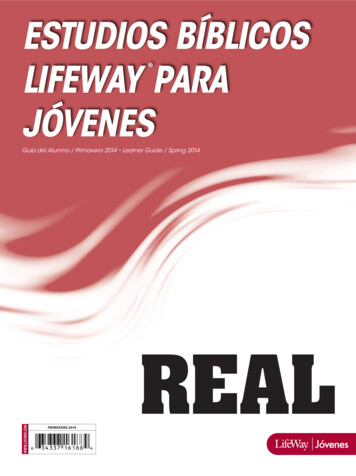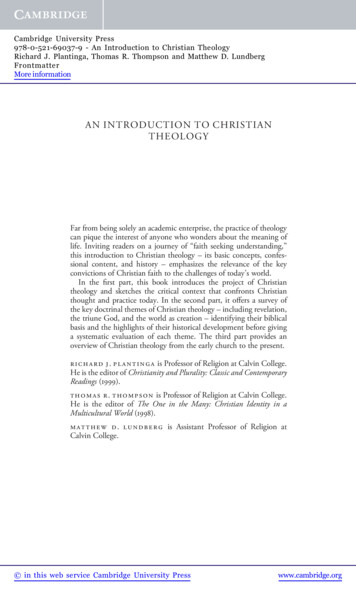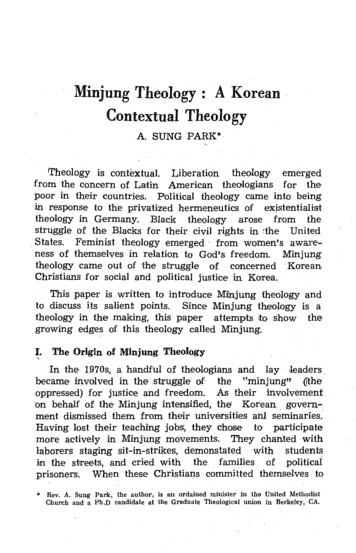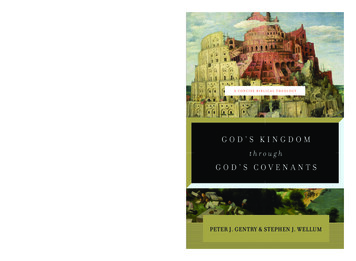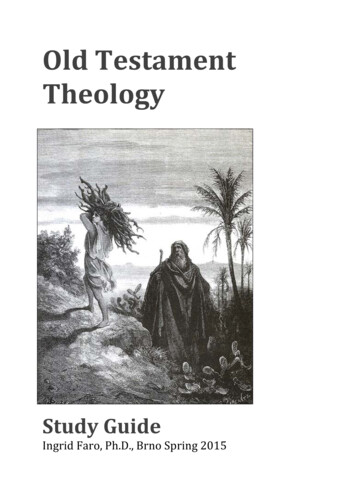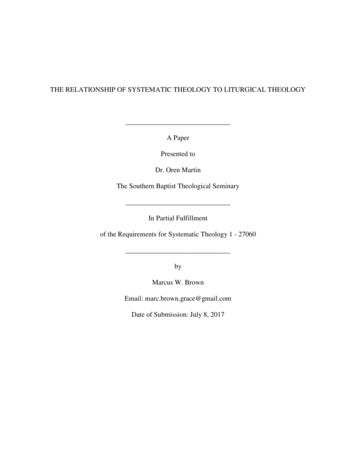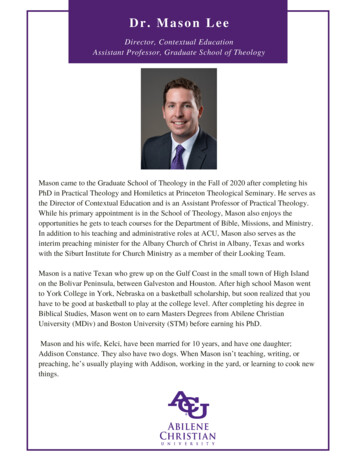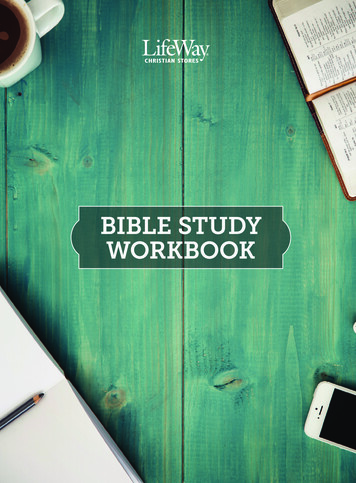
Transcription
The State of AmericanTheology Study 2020Commissioned by Ligonier MinistriesTheStateofTheology.com
2Methodology A demographically balanced online panel was usedfor interviewing American adults 3,002 surveys were completed March 10-18, 2020 The sample provides 95% confidence that thesampling error from the online panel does notexceed 2.0% Margins of error are higher in sub-groups Slight weights were used to balance gender, age,ethnicity, income, region, and religion
Survey Responses
4God is a perfect being and cannotmake a 12%StronglyDisagreeNot 1 1: “For each of the following statements, please indicate your level of agreement. God is a perfect being and cannot make a mistake.”
There is one true God in threepersons: God the Father, God the Son,and God the Holy 3%StronglyDisagreeNot 1 2: “For each of the following statements, please indicate your level of agreement. There is one true God in three persons: God theFather, God the Son, and God the Holy Spirit.”5
God accepts the worship of allreligions, including Christianity,Judaism and lyDisagreeNot sagreeQ21 3: “For each of the following statements, please indicate your level of agreement. God accepts the worship of all religions,including Christianity, Judaism and Islam.”
7God created male and StronglyDisagreeNot 1 4: “For each of the following statements, please indicate your level of agreement. God created male and female.”
Biblical accounts of the physical (bodily)resurrection of Jesus are completelyaccurate. This event actually %14%SomewhatDisagreeStronglyDisagreeNot Sure0%StronglyAgreeSomewhatAgreeQ22 1: “For each of the following statements, please indicate your level of agreement. Biblical accounts of the physical (bodily)resurrection of Jesus are completely accurate. This event actually occurred.”8
9Jesus is the first and greatest beingcreated by yDisagreeQ22 2: “For each of the following statements, please indicate your level of agreement. Jesus is the first and greatest being created by God.”Not Sure
10Jesus was a great teacher, but he wasnot lyDisagreeQ22 3: “For each of the following statements, please indicate your level of agreement. Jesus was a great teacher, but he was not God.”Not Sure
11The Holy Spirit is a force but is not apersonal nglyDisagreeNot reeQ23 1: “For each of the following statements, please indicate your level of agreement. The Holy Spirit is a force but is not a personal being.”
The Holy Spirit gives a spiritual newbirth or new life before a person hasfaith in Jesus nglyDisagreeQ23 2: “For each of the following statements, please indicate your level of agreement. The Holy Spirit gives a spiritual new birth ornew life before a person has faith in Jesus Christ.”Not Sure12
The Holy Spirit can tell me to dosomething which is forbidden in %StronglyDisagreeQ23 3: “For each of the following statements, please indicate your level of agreement. The Holy Spirit can tell me to do somethingwhich is forbidden in the Bible.”Not Sure
14Everyone sins a little, but most peopleare good by nglyDisagreeQ24 1: “For each of the following statements, please indicate your level of agreement. Everyone sins a little, but most people are good by nature.”Not Sure
15Even the smallest sin deserves %10%0%StronglyDisagreeQ24 2: “For each of the following statements, please indicate your level of agreement. Even the smallest sin deserves eternal damnation.”Not Sure
God counts a person as righteous notbecause of one’s works but onlybecause of one’s faith in Jesus StronglyDisagreeNot eQ24 3: “For each of the following statements, please indicate your level of agreement.” God counts a person as righteous not becauseof one’s works but only because of one’s faith in Jesus Christ.16
The Bible, like all sacred writings,contains helpful accounts of ancientmyths but is not literally onglyDisagreeQ25 1: “For each of the following statements, please indicate your level of agreement. The Bible, like all sacred writings, containshelpful accounts of ancient myths but is not literally true.”Not Sure
18The Bible is 100% accurate in all thatit onglyDisagreeQ25 2: “For each of the following statements, please indicate your level of agreement. The Bible is 100% accurate in all that it teaches.”Not Sure
19Modern science disproves the 0%0%StronglyAgreeSomewhatAgreeSomewhatDisagreeQ25 3: “For each of the following statements, please indicate your level of agreement. Modern science disproves the Bible.”StronglyDisagreeNot Sure
20God will always reward true faithwith material blessings in this glyDisagreeQ26 1: “For each of the following statements, please indicate your level of agreement. God will always reward true faith with materialblessings in this life.”Not Sure
21Hell is a real place where certainpeople will be punished %StronglyDisagreeNot eQ26 2: “For each of the following statements, please indicate your level of agreement. Hell is a real place where certain people will bepunished forever.”
There will be a time when Jesus Christreturns to judge all the people whohave nglyDisagreeNot reeQ26 3: “For each of the following statements, please indicate your level of agreement. There will be a time when Jesus Christ returnsto judge all the people who have lived.”22
Worshiping alone or with one’s familyis a valid replacement for regularlyattending SomewhatDisagreeStronglyDisagreeNot Sure10%0%StronglyAgreeSomewhatAgreeQ27 1: “For each of the following statements, please indicate your level of agreement. Worshiping alone or with one’s family is a validreplacement for regularly attending church.”23
24Christians should be silent on issues eStronglyDisagreeQ27 2: “For each of the following statements, please indicate your level of agreement. Christians should be silent on issues of politics.”Not Sure
25God chose the people he would savebefore he created the nglyDisagreeQ27 3: “For each of the following statements, please indicate your level of agreement. God chose the people he would save before hecreated the world.”Not Sure
Churches must provide entertainingworship services if they want to eeStronglyDisagreeQ27 4: “For each of the following statements, please indicate your level of agreement. Churches must provide entertaining worshipservices if they want to be effective.”Not Sure26
27God is unconcerned with my day-today StronglyDisagreeQ28 1: “For each of the following statements, please indicate your level of agreement. God is unconcerned with my day-to-day decisions.”Not Sure
28The Bible has the authority to tell uswhat we must DisagreeQ28 2: “For each of the following statements, please indicate your level of agreement. The Bible has the authority to tell us what we must do.”Not Sure
29Learning about theology is for pastorsand scholars yDisagreeQ28 3: “For each of the following statements, please indicate your level of agreement. Learning about theology is for pastors and scholars only.”Not Sure
30Sex outside of traditional marriage isa yDisagreeQ29 1: “For each of the following statements, please indicate your level of agreement. Sex outside of traditional marriage is a sin.”Not Sure
31Abortion is a 0%StronglyAgreeSomewhatAgreeSomewhatDisagreeQ29 2: “For each of the following statements, please indicate your level of agreement. Abortion is a sin.”StronglyDisagreeNot Sure
32Gender identity is a matter of onglyDisagreeQ29 3: “For each of the following statements, please indicate your level of agreement. Gender identity is a matter of choice.”Not Sure
The Bible’s condemnation ofhomosexual behavior doesn’t reeStronglyDisagreeQ29 4: “For each of the following statements, please indicate your level of agreement. The Bible’s condemnation of homosexualbehavior doesn’t apply today.”Not Sure
34Religious belief is a matter of personalopinion; it is not about objective nglyDisagreeQ29 5: “For each of the following statements, please indicate your level of agreement. Religious belief is a matter of personal opinion;it is not about objective truth.”Not Sure
35The Bible is the highest authority forwhat I %0%StronglyAgreeSomewhatAgreeSomewhatDisagreeQ30 1: “For each of the following statements, please indicate your level of agreement. The Bible is the highest authority for what I believe.”StronglyDisagree
It is very important for me personallyto encourage non-Christians to trustJesus Christ as their 0%StronglyAgreeSomewhatAgreeSomewhatDisagreeQ30 2: “For each of the following statements, please indicate your level of agreement. It is very important for me personally toencourage non-Christians to trust Jesus Christ as their Savior.”StronglyDisagree36
Jesus Christ’s death on the cross is theonly sacrifice that could remove thepenalty of my atAgreeQ30 3: “For each of the following statements, please indicate your level of agreement. Jesus Christ’s death on the cross is the onlysacrifice that could remove the penalty of my sin.”37
Only those who trust in Jesus Christalone as their Savior receive God’sfree gift of eternal SomewhatAgreeQ30 4: “For each of the following statements, please indicate your level of agreement. Only those who trust in Jesus Christ alone astheir Savior receive God’s free gift of eternal salvation.”38
39Significant DifferencesRegionAgeGenderEducation LevelHousehold IncomeLocationReligious Service AttendanceChristian Religious TraditionsEvangelical Beliefs
40Significant StatisticalDifferencesComparisons were made to determine if there are any significantstatistical differences among region of the country, age, gender,education level, and household income.RegionAgeGenderEducationHH IncomeNortheast18-34MaleHigh Schoolgraduate or lessLess than 25,000Midwest35-49FemaleSome college 25- 34,999South50-64Bachelor’s Degree 35- 49,999West65 Graduate Degree 50- 74,499 75- 99,999 100,000 or moreNote: Region is defined by US Census locations
41Significant StatisticalDifferencesComparisons were made to determine if there are any significantstatistical differences among locations, religious service attendance,Christian religious traditions, and Evangelical nReligiousTraditionsEvangelicalBeliefsLarge city(100,000 ormore)At least onceor twice amonthEvangelicalYesSmall city (lessthan 100,000)NeverBlack ProtestantNoSuburbMainlineRural AreaCatholic
42Evangelical Beliefs Evangelical Beliefs are defined using the NAE LifeWay ResearchEvangelical Beliefs Research Definition based on respondent beliefs Respondents are asked their level of agreement with four separatestatements using a four-point, forced choice scale (strongly agree,somewhat agree, somewhat disagree, strongly disagree). Thosewho strongly agree with all four statements are categorized ashaving Evangelical Beliefs The Bible is the highest authority for what I believe It is very important for me personally to encourage non-Christians totrust Jesus Christ as their Savior Jesus Christ’s death on the cross is the only sacrifice that could removethe penalty of my sin Only those who trust in Jesus Christ alone as their Savior receive God’sfree gift of eternal salvation
“God is a perfect being and cannot make amistake.” Americans in the South (70%) are more likely to Agree than those inthe Northeast (62%) and West (60%) Americans age 18-34 are the least likely to Agree (59%) Americans who attend a religious service at least once or twice amonth are more likely to Agree than those who do not (88% v. 47%) Evangelicals (91%) and Black Protestants (92%) are more likely toagree than Mainlines (66%) and Catholics (72%) Americans with Evangelical Beliefs are more likely to Agree thanthose without Evangelical Beliefs (97% v. 58%)43
“There is one true God in three persons:God the Father, God the Son, and God theHoly Spirit.” Americans who attend a religious service at least once or twice amonth are more likely to Agree than those who do not (90% v. 58%) Mainlines are the least likely to Agree (79%) Americans with Evangelical Beliefs are more likely to Agree thanthose without Evangelical Beliefs (96% v. 66%)44
“God accepts the worship of all religions,including Christianity, Judaism and Islam.” Americans with a Graduate degree are the most likely to Agree(69%) Americans who attend a religious service at least once or twice amonth are more likely to Disagree than those who do not (30% v.18%) Evangelicals are the most likely to Disagree (46%) Americans with Evangelical Beliefs are more likely to Disagree thanthose without Evangelical Beliefs (49% v. 17%)45
46“God created male and female.” Americans who are High School Graduates or less are the mostlikely to Agree (85%) Americans with household income of 100,000 or more are the leastlikely to Agree (74%) Americans who attend a religious service at least once or twice amonth are more likely to Agree than those who do not (95% v. 67%) Evangelicals (96%) and Black Protestants (96%) are more likely toAgree than Mainlines (86%) and Catholics (89%) Americans with Evangelical Beliefs are more likely to Agree thanthose without Evangelical Beliefs (100% v. 74%)
“Biblical accounts of the physical (bodily)resurrection of Jesus are completelyaccurate. This event actually occurred.” Americans age 18-34 are the least likely to Agree (59%) Americans with household income of 25,000- 34,999 (69%), 35,000- 49,999 (72%), and 75,000- 99,000 (69%) are more likelyto Agree than those with income of 100,000 or more (62%) Americans who attend a religious service at least once or twice amonth are more likely to Agree than those who do not (89% v. 48%) Evangelicals (92%) and Black Protestants (92%) are more likely toAgree than Mainlines (71%) and Catholics (75%) Americans with Evangelical Beliefs are more likely to Agree thanthose without Evangelical Beliefs (98% v. 59%)47
“Jesus is the first and greatest being createdby God.” Americans who are High School Graduates or less are the mostlikely to Agree (67%) Americans with household income of 100,000 or more are the leastlikely to Agree (48%) Americans who attend a religious service at least once or twice amonth are more likely to Agree than those who do not (68% v. 44%) Black Protestants (74%) and Catholics (66%) are more likely toAgree than Evangelicals (56%) and Mainlines (59%) Americans with Evangelical Beliefs are more likely to Agree thanthose without Evangelical Beliefs (65% v. 52%)48
“Jesus was a great teacher, but he was notGod.” Americans who are High School Graduates or less are the leastlikely to Disagree (29%) Americans who attend a religious service at least once or twice amonth are more likely to Disagree than those who do not (50% v.25%) Evangelicals are the most likely to Disagree (64%) Americans with Evangelical Beliefs are more likely to Disagree thanthose without Evangelical Beliefs (66% v. 29%)49
“The Holy Spirit is a force but is not apersonal being.” Americans who attend a religious service at least once or twice amonth are more likely to Disagree than those who do not (32% v.18%) Mainlines (73%) and Catholics (72%) are more likely to Agree thanEvangelicals (51%) and Black Protestants (57%) Americans with Evangelical Beliefs are more likely to Disagree thanthose without Evangelical Beliefs (43% v. 19%)50
“The Holy Spirit gives a spiritual new birthor new life before a person has faith in JesusChrist.” Americans in the West are most likely to Disagree (30%) Americans age 18-34 (54%) and 35-49 (55%) are more likely toAgree than those 50-64 (48%) and 65 (44%) Americans with household income of less than 25,000 (53%), 25,000- 34,999 (57%), and 75,000- 99,999 (56%) are more likelyto Agree than those with income of 100,000 or more (46%) Americans who attend a religious service at least once or twice amonth are more likely to Agree than those who do not (63% v. 42%) Black Protestants (69%) and Catholics (68%) are more likely toAgree than Evangelicals (53%) and Mainlines (54%)51
“The Holy Spirit can tell me to dosomething which is forbidden in the Bible.” Americans age 18-34 are the most likely to Agree (28%) Americans with some college are the most likely to Disagree (66%) Americans in a Large city are the most likely to Agree (27%) Americans who attend a religious service at least once or twice amonth are more likely to Agree than those who do not (26% v. 14%) Black Protestants (28%) and Catholics (28%) are more likely toAgree than Evangelicals (15%) and Mainlines (12%) Americans with Evangelical Beliefs are more likely to Disagree thanthose without Evangelical Beliefs (78% v. 56%)52
“Everyone sins a little, but most people aregood by nature.” Americans age 65 are most likely to Agree (73%) Americans with household income of 25,000- 34,999 (66%), 50,000- 74,999 (67%), 75,000- 99,999 (70%), and 100,000 ormore (66%) are more likely to Agree than those with income of lessthan 25,000 (58%) Americans who attend a religious service at least once or twice amonth are more likely to Disagree than those who do not (34% v.23%) Mainlines (80%) and Catholics (76%) are more likely to Agree thanEvangelicals (47%) and Black Protestants (62%) Americans with Evangelical Beliefs are more likely to Disagree thanthose without Evangelical Beliefs (49% v. 23%)53
“Even the smallest sin deserves eternaldamnation.” Americans age 18-34 (29%) and 35-49 (32%) are more likely toAgree than those Americans who are 50-64 (21%) and 65 (18%) High School Graduates or less are the least likely to Disagree (57%) Americans in a Large city are the least likely to Disagree (59%) Americans who attend a religious service at least once or twice amonth are more likely to Agree than those who do not (41% v. 13%) Evangelicals (40%) and Black Protestants (45%) are more likely toAgree than Mainlines (14%) and Catholics (25%) Americans with Evangelical Beliefs are more likely to Agree thanthose without Evangelical Beliefs (51% v. 19%)54
“God counts a person as righteous notbecause of one’s works but only because ofone’s faith in Jesus Christ.” Americans with a Bachelor’s degree (33%) are more likely toDisagree than those who are High School Graduates or less (23%) Americans with household income of 35,000- 49,999 (31%), 50,000- 74,999 (29%), 75,000- 99,999 (29%), and 100,000 ormore (32%) are more likely to Disagree than those with income ofless than 25,000 (22%) Americans who attend a religious service at least once or twice amonth are more likely to Agree than those who do not (74% v. 42%) Evangelicals (80%) and Black Protestants (73%) are more likely toAgree than Mainlines (55%) and Catholics (58%) Americans with Evangelical Beliefs are more likely to Agree thanthose without Evangelical Beliefs (84% v. 49%)55
“The Bible, like all sacred writings, containshelpful accounts of ancient myths but is notliterally true.” Americans in the Northeast are the most likely to Agree (56%) Americans age 18-34 (50%) and 65 (52%) are more likely to Agreethan those 50-64 (42%) Males are more likely to Agree than Females (53% v. 43%) Americans with a Graduate degree are the most likely to Agree(59%) Americans with household income of 100,000 or more are the mostlikely to Agree (57%) Americans in a Large city (51%) or Suburbs (50%) are more likely toAgree than those in a Small city (42%) or rural area (41%)56
“The Bible, like all sacred writings, containshelpful accounts of ancient myths but is notliterally true.” Americans who attend a religious service at least once or twice amonth are more likely to Disagree than those who do not (57% v.29%) Mainlines (56%) and Catholics (55%) are more likely to Agree thanEvangelicals (23%) and Black Protestants (38%) Americans with Evangelical Beliefs are more likely to Disagree thanthose without Evangelical Beliefs (81% v. 32%)57
“The Bible is 100% accurate in all that itteaches.” Americans in the South (53%) are more likely to Agree than those inthe Northeast (42%) and West (45%) Americans age 35-49 (54%) are more likely to Agree than those 1834 (46%) and 65 (43%) Americans who are High School Graduates or less (55%) or withsome college (51%) are more likely to Agree than those with aGraduate degree (41%) Americans with household income of 100,000 or more are the leastlikely to Agree (43%) Americans who attend a religious service at least once or twice amonth are more likely to Agree than those who do not (72% v. 30%) Evangelicals (77%) and Black Protestants (77%) are more likely toAgree than Mainlines (35%) and Catholics (52%) Americans with Evangelical Beliefs are more likely to Agree thanthose without Evangelical Beliefs (91% v. 38%)58
59“Modern science disproves the Bible.” Americans in the Northeast are the most likely to Agree (42%) Americans age 18-34 are the most likely to Agree (44%) Americans in a Large city are the most likely to Agree (39%) Americans who attend a religious service at least once or twice amonth are less likely to Agree than those who do not (28% v. 39%) Black Protestants (33%) and Catholics (38%) are more likely toAgree than Evangelicals (16%) and Mainlines (23%) Americans with Evangelical Beliefs are less likely to Agree thanthose without Evangelical Beliefs (17% v. 38%)
“God will always reward true faith withmaterial blessings in this life.” Americans age 18-34 are the most likely to Agree (47%) Americans who are High School Graduates or less are the mostlikely to Agree (43%) Americans with household income of 100,000 or more are the mostlikely to Disagree (60%) Americans in a Large city (43%) or a small city (38%) are more likelyto Agree than those in a Suburb (30%) or a Rural area (30%) Americans who attend a religious service at least once or twice amonth are more likely to Agree than those who do not (46% v. 27%) Black Protestants are the most likely to Agree (62%)60
“Hell is a real place where certain peoplewill be punished forever.” Americans in the Midwest (58%) and South (60%) are more likely toAgree than those in the Northeast (49%) and West (52%) Americans age 35-49 are the most likely to Agree (64%) Americans with a Bachelor’s degree (32%) or a Graduate degree(33%) are more likely to Disagree than those who are High SchoolGraduates or less (22%) or with some college (25%) Americans with household income of less than 25,000 (61%) and 25,000- 34,999 (63%) are more likely to Agree than those withincome of 50,000- 74,999 (54%) and 100,000 or more (52%) Americans who attend a religious service at least once or twice amonth are more likely to Agree than those who do not (77% v. 39%) Evangelicals (81%) and Black Protestants (86%) are more likely toAgree than Mainlines (49%) and Catholics (63%) Americans with Evangelical Beliefs are more likely to Agree thanthose without Evangelical Beliefs (92% v. 47%)61
“There will be a time when Jesus Christreturns to judge all the people who have lived.” Americans in the Midwest (66%) and South (66%) are more likely toAgree than those in the Northeast (53%) and West (58%) Americans age 35-49 (67%) and 50-64 (66%) are more likely toAgree than those 18-34 (57%) and 65 (57%) Americans with a Bachelor’s degree (27%) or a Graduate degree(28%) are more likely to Disagree than those who are High SchoolGraduates or less (18%) or with some college (18%) Americans with household income of 75,000- 99,999 (24%) and 100,000 or more (28%) are more likely to Disagree than those withincome of less than 25,000 (17%) and 35,000- 49,999 (18%) Americans who attend a religious service at least once or twice amonth are more likely to Agree than those who do not (84% v. 44%) Black Protestants are the most likely to Agree (94%); Mainlines areleast likely to Agree (59%) Americans with Evangelical Beliefs are more likely to Agree thanthose without Evangelical Beliefs (97% v. 54%)62
“Worshiping alone or with one’s family is avalid replacement for regularly attendingchurch.” Americans with a Graduate degree are the most likely to Agree(65%) Americans who attend a religious service at least once or twice amonth are more likely to Disagree than those who do not (44% v.17%) Evangelicals (49%) and Black Protestants (48%) are more likely toDisagree than Mainlines (23%) and Catholics (27%) Americans with Evangelical Beliefs are more likely to Disagree thanthose without Evangelical Beliefs (55% v. 23%)63
“Christians should be silent on issues ofpolitics.” Americans age 65 are the most likely to Disagree (81%) Americans who are High School Graduates or less are the leastlikely to Disagree (56%) Americans with household income of 75,000- 99,999 (69%) aremore likely to Disagree than those with income of less than 25,000(57%) and 25,000- 34,999 (61%) Evangelicals are the most likely to Disagree (82%) Americans with Evangelical Beliefs are more likely to Disagree thanthose without Evangelical Beliefs (78% v. 62%)64
“God chose the people he would save beforehe created the world.” Americans age 50-64 (57%) and 65 (61%) are more likely toDisagree than those 18-34 (41%) and 35-49 (46%) Americans who are High School Graduates or less are the leastlikely to Disagree (41%) Americans with household income of less than 25,000 are the leastlikely to Disagree (38%) Americans in a Large city are the most likely to Agree (36%) Americans who attend a religious service at least once or twice amonth are more likely to Agree than those who do not (39% v. 17%) Black Protestants are the most likely to Agree (43%) Americans with Evangelical Beliefs are more likely to Agree thanthose without Evangelical Beliefs (38% v. 24%)65
“Churches must provide entertainingworship services if they want to beeffective.” Americans in the Midwest (54%) and West (50%) are more likely toDisagree than those in the Northeast (43%) Americans age 18-34 are the most likely to Agree (44%) Americans with some college are the most likely to Disagree (55%) Americans in a Large city are the most likely to Agree (45%) Evangelicals are the most likely to Disagree (64%) Americans with Evangelical Beliefs are more likely to Disagree (68%v. 45%)66
“God is unconcerned with my day-to-daydecisions.” Americans in the Midwest (65%) and South (64%) are more likely toDisagree than those in the Northeast (53%) and West (60%) Americans age 18-34 are the most likely to Agree (34%) Males are more likely to Agree than Females (31% v. 20%) Americans with household income of 35,000- 49,999 (68%) aremore likely to Disagree than those with income of 100,000 or more(58%) Americans in a Large city are the most likely to Agree (31%) Americans who attend
The Bible is 100% accurate in all that it teaches. 18 29% 19% 18% 24% 9% 0% 10% 20% 30% 40% 50% 60% 70% 80% 90% 100% Strongly Agree Somewhat Agree Somewhat Disagree Strongly Disagree Not Sure Q25_2: “For each of the following statements, please indicate your level of agreement. The
